|
|
|
Sort Order |
|
|
|
Items / Page
|
|
|
|
|
|
|
| Srl | Item |
| 1 |
ID:
136675


|
|
|
|
|
| Summary/Abstract |
The 2014 general elections in India saw an increase of over a hundred million eligible voters as compared to 2009. This paper analyses the chord struck by the Narendra Modi-led Bharatiya Janata Party (BJP) with first-time voters. A survey in the Pilibhit district of Uttar Pradesh revealed that young voters, contrary to historical trends in the state did not consider caste or religious affiliations to be of substantive importance. Instead, they gave precedence to issues of corruption and development indicating a paradigm shift in thinking and a willingness to move beyond social divides and focus on economic concerns. The BJP emerged as the most popular party among participants as they felt it promised corruption-free developmental governance.
|
|
|
|
|
|
|
|
|
|
|
|
|
|
|
|
| 2 |
ID:
134789
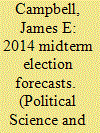

|
|
|
|
|
| Summary/Abstract |
In about two months, more than 90 million Americans (roughly 40% of those eligible to vote) will elect 435 members of the US House of Representatives and 36 members of the US Senate. The results of this midterm election will go a long way in determining the direction and extent of political change during the next two years. At present, like the nation itself, Congress is divided. Democrats hold a majority in the Senate, Republicans a majority in the House. To take control of the House, Democrats must gain 17 seats beyond the 201 they won in 2012 or 19 more than their current 199 seats (with three vacancies). Republicans must pick up six seats to regain their Senate majority. The Senate’s current party division is 53 Democrats and 45 Republicans. The two independents who caucus with the Democrats and the vice presidential tie-breaker put the Republicans’ magic number at six.
|
|
|
|
|
|
|
|
|
|
|
|
|
|
|
|
| 3 |
ID:
134840
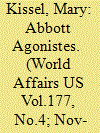

|
|
|
|
|
| Summary/Abstract |
You know things aren’t going well for conservative Australian Prime Minister Tony Abbott when the Institute of Public Affairs (IPA) in Melbourne, the country’s most prominent free-market think tank and formerly Abbott’s biggest cheerleader, takes out a full-page advertisement in the Australian newspaper to criticize him. Published on August 8th, the ad quotes Abbott from a speech he gave at the think tank two years earlier: “Freedom of speech is an essential foundation of democracy.” Then it continues: “We agree, Prime Minister. That’s why we will fight to repeal section 18C of the Racial Discrimination Act. Even if you won’t.”
|
|
|
|
|
|
|
|
|
|
|
|
|
|
|
|
| 4 |
ID:
135400


|
|
|
|
|
| Summary/Abstract |
The 2014 elections are over and the Republican Party has emerged victorious. Beyond anyone’s expectations they have picked up eight new seats in the Senate (possibly one more after Louisiana completes a run-off), at least 12 more seats in the House of Representatives, and three new governorships. The vaunted Democratic voter-turnout technology was simply no match for a sour public mood. Two weeks before election day, when President Obama declared that his policies were on the ballot, even though his name would not formally appear in any state, he was surely correct. The election was all about Obama. Interestingly, Republicans only needed one message: ‘We are not the party of Barack Obama.’
|
|
|
|
|
|
|
|
|
|
|
|
|
|
|
|
| 5 |
ID:
136651
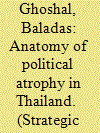

|
|
|
|
|
| Summary/Abstract |
With the take-over of power by the military on May 22, 2014, under General Prayuth Chan-O-Cha, the chief of army, Thailand has gone full circle in coup d’états, from democratic deficit to fractious political struggle between different social groups leading to acute and irreconcilable political instability that gives leverage to the army to finally intervene and seize power by suspending the constitutional processes. Democracy in Thailand is not only a recent phenomenon, but is also periodic and short-lived. It is not democracy and political legitimacy of elected leaders that has held the country together and provided political and economic stability, but deep reverence for the monarchy, fear of the armed forces and the strength of the civil service. Thailand’s political system is in a state of atrophy in the midst of irreconcilable differences between those who want to cling to power through constitutional means, fair or unfair, of elections and populist policies and those who believe that constitutional means have brought about a tyranny of majority and unbridled corruption, which they want to reform through extraordinary measures, including suspension of electoral democracy and an unelected People’s Council. Will the military be able to resolve the political crisis in Thailand, bring stability and usher the country to constitutional democracy with political institutions matching the nation’s economic progress? If the complete failure of the previous coup in 2006 to improve Thailand’s political situation is any indication, there are reasons for concern and scepticism. Moreover, the degree of polarisation and intolerance in society now is more severe than it was eight years ago. To end decades of political instability and immaturity will require fundamental changes in the way Thai society functions and the way its people view their nation’s future.
|
|
|
|
|
|
|
|
|
|
|
|
|
|
|
|
| 6 |
ID:
135965


|
|
|
|
|
| Summary/Abstract |
ACCORDING TO FREEDOM HOUSE (2013),1 among countries with populations higher than 200,000, the proportion of electoral democracies is 56 percent (98/174) worldwide, whereas it is only 20 percent (10/49) in Muslim-majority countries. The average Freedom House score (1 for most and 7 for least democratic) for all countries (3.5) is also better than the average score for Muslim-majority countries (5.1). Analyzing countries with populations over 500,000, Polity (2010) reaches a similar result: 57 percent (93/164) of all countries and 28 percent (13/47) of Muslim-majority countries are democracies.2 Why is the rate (and score) of democracy disproportionately low among Muslim-majority countries? This article argues that the combined effects of rentier states and regional diffusion provide the best explanation.
|
|
|
|
|
|
|
|
|
|
|
|
|
|
|
|
| 7 |
ID:
136831
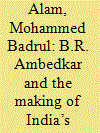

|
|
|
|
|
| Summary/Abstract |
B.R.Ambedkar occupies a special place in the development of constitutional democracy in Modern Asia. Born an untouchable he was sponsored by the progressive Maharaja of Baroda, India to improve his education. It was an assignment that the young Ambedkar accepted with gusto.
|
|
|
|
|
|
|
|
|
|
|
|
|
|
|
|
| 8 |
ID:
136833
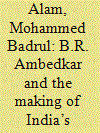

|
|
|
|
|
| Summary/Abstract |
B.R.Ambedkar occupies a special place in the development of constitutional democracy in Modern Asia. Born an untouchable he was sponsored by the progressive Maharaja of Baroda, India to improve his education. It was an assignment that the young Ambedkar accepted with gusto.
|
|
|
|
|
|
|
|
|
|
|
|
|
|
|
|
| 9 |
ID:
136683


|
|
|
|
|
| Summary/Abstract |
Many see Bangladesh as a land of great possibilities and several promises have been made to tap its potential for the benefit of the country and the betterment of the people. Despite progress, albeit at a slow pace, the country's growth has been and continues to be hampered by problems created by the people at the helm, irrespective of party affiliations. Corruption keeps nibbling at the vitals of the nation, opening wide the “get-rich-overnight” option for all power-mongers. The current scenario of two-party dominance and their tussle for power compounded by social degradation has impeded qualitative changes in the realm and nature of democracy. Exploitation by influential sections has not decreased while dissatisfaction based on poor governance continues to fester. On the positive side however, resilience, at times on the part of the government and always on the part of the masses, has been remarkable.
|
|
|
|
|
|
|
|
|
|
|
|
|
|
|
|
| 10 |
ID:
135999


|
|
|
|
|
| Summary/Abstract |
Today, most military regimes have either given way to some form of democracy or been transformed into another form of authoritarianism. This article formulates a framework for the analysis of the detachment of militaries from politics and applies it to the case of Burma/Myanmar, which is an example of deeply entrenched military rule. It is argued that after the retreat from direct rule the military is still in control, although the regime has embarked on a series of reforms that have liberalized the political system. The article identifies the internal dynamics within the military regime as a prime motive. External factors played only an indirect role, as the growing dependence on China was seen as a threat among nationalistic circles. The military decided to bridge the internal impasse and end the external isolation only after it consolidated its own power, finally allowing the leadership succession to run smoothly.
|
|
|
|
|
|
|
|
|
|
|
|
|
|
|
|
| 11 |
ID:
136928


|
|
|
|
|
| Summary/Abstract |
The puzzle that we address in this essay is the extreme unevenness in the way the Russian public protests against authoritarianism and demands political reforms. Between 2000 and 2013 there were numerous local protests demanding specific actions by municipal or regional officials (for example, to prevent local factory bankruptcy, to stop construction, and to expel migrants). There were also protests demanding better public goods and services such as education, healthcare, and transport, to stop welfare reforms, or against the reorganisation of scientific funding. However, when it comes to protests concerning demands for political reforms such as free and fair elections, the protection of human rights, and for institutionalised democracy, most of the activity was limited to Moscow and other very large cities (Robinson 2013). Elsewhere, the scope of pro-democracy action remained much more limited. A 2012 opinion poll by the Levada Centre has shown that only around 20% of Russians (mostly residents of the largest cities) support the idea of in-depth political reforms, leaving the remaining 80% either against democratic reforms or indifferent to the idea. Furthermore, based on demographic covariates, Levada Centre analysts forecast that this 20–80 breakdown on the issue is set to persist for the foreseeable future.1
|
|
|
|
|
|
|
|
|
|
|
|
|
|
|
|
| 12 |
ID:
135276


|
|
|
|
|
| Summary/Abstract |
Whilst the middle class are often heralded as forerunners for consolidating democracy, the experiences of Kikuyu in Kenya's 2013 election reveal how under-problematised the socio-economic group is for understanding the pressures faced in voting. The article presents evidence from diary entries of young middle class Kikuyu residing in Nairobi who recorded their feelings and impressions across a period of one month surrounding the country's elections. The diary writers describe the key moments at which they felt the need to switch from supporting third-placed presidential hopefuls to supporting one of the two favourites. Topics felt to pressure voters most keenly were ethnicity, social media, debate surrounding the International Criminal Court and the lack of confidence in others of the middle class. Unlike election analyses which assume static preferences and voting blocks, this methodology allows exploration of the ongoing negotiations and deliberations that influence voting intentions over time. The tensions felt by middle class Kikuyu during the election period made them wish they were members of either of the two other classes, who were in turn viewed as able to influence politics through money or popular power. These feelings of disempowerment ensured voting attitudes fell closely in line with ethnic affiliations, despite members of the middle class remaining wholly dissatisfied with ethnic labelling throughout. It is argued that the economic autonomy of middle class voters did not help disengage them from political tribalism in assessing how to vote.
|
|
|
|
|
|
|
|
|
|
|
|
|
|
|
|
| 13 |
ID:
134542
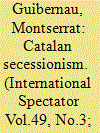

|
|
|
|
|
| Summary/Abstract |
Various factors have triggered the recent shift from devolution to secession in Catalonia: the Aznar government’s lack of response to demands for greater autonomy for Catalonia, the legal challenging of the 2006 Statute of Autonomy of Catalonia and, increasingly, economic arguments as Catalan society endures a harsh economic crisis. After evaluating the impact of the Spanish transition to democracy upon younger generations’ expectations regarding the meaning and content of democracy in post-Franco Spain, it is argued that democracy based upon ‘consensus’ rather than ‘majoritarian democracy’ would be better suited to respond to national minorities’ demands in Spain.
|
|
|
|
|
|
|
|
|
|
|
|
|
|
|
|
| 14 |
ID:
135918


|
|
|
|
|
| Summary/Abstract |
Recent debates on societal transitions to democracy have focused their attention on the notion of “civil society,” putting great hope in its democratizing effects. This essay re- examines the notion’s utility in the context of the post-2011 Arab Spring uprisings in Tunisia and Egypt. It argues that at least in its conceptualization along the lines of the “transition paradigm,” the civil society framework is unable to capture the complex catalysts of the non-teleological, open-ended uprisings in North Africa. Not only does it largely ignore the importance of socioeconomic forces as well as the non-institutionalized, spontaneous forms of organization present in these democratization processes; the analytical failure of the civil society framework also takes up a transformative power in and of itself, structuring the empirical realities that it claims to describe. The concept of civil society therefore fails to accurately represent the dynamics at play in Tunisia and Egypt, and has negatively shaped them with respect to the outcomes of revolutionary contestation. “Civil society” has integrated an open and contingent arena into the closed structures of reproduced sovereign statehood. Rather than unleashing democratic energies in Tunisia and Egypt, it has sometimes even reinforced the very power structures it allegedly set out to challenge. Borrowing from the work of Hannah Arendt on revolution and Giorgio Agamben on the notion of “destituent power,” this essay argues for a conceptual opening in our analytical framework that corresponds to the radical contingency that lies at the heart of any revolutionary process.
|
|
|
|
|
|
|
|
|
|
|
|
|
|
|
|
| 15 |
ID:
136930


|
|
|
|
|
| Summary/Abstract |
Following the events that ensued after the December 2011 Russian parliamentary elections, the study of civic activity in Russia became highly topical. We can make two immediate observations on the nature and methodology of research on Russian civil society. First, the media and some academic critics tend to equate Russia's civil society with the liberal opposition to Putin's government. While liberal oppositional movements undeniably have a civic character and represent a significant part of Russia's civil society, much of Western analysis tends to appropriate this opposition's narrative for the purpose of narrating Russia's entire civic activism. Hence, these critics often focus on what they see as suitable, relevant, and reflective of the political and philosophical consensus prevalent in the West. As a result, those movements, personalities, and ideas that mirror core European political values receive wide analytical and media focus, while others that fall beyond the bounds of the existing liberal consensus are shelved, considered irrelevant or even plain erroneous. Yet, those ideas, which may appear at first glance to be at odds with the contemporary Western context, may prove upon close examination to be of the most immediate political significance for Russia.
|
|
|
|
|
|
|
|
|
|
|
|
|
|
|
|
| 16 |
ID:
137088
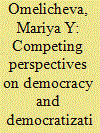

|
|
|
|
|
| Summary/Abstract |
This study examines alternative understandings of democracy and democracy promotion advanced by the US, EU, Russia and China in Central Asia using frame analysis. In the context of this study, ‘frames’ refer to the relatively cohesive sets of beliefs, categories and value judgements as well as specific ways in which these ideas are packaged for the targets of international democratization. The study assesses the implications of alternative representations of democracy promotion and competing models of governance for the prospects of democratization in Central Asia. It concludes that the substance of US and EU democracy promotion in Central Asia has neglected the cultural and political contexts of these states, while the Russian and Chinese models of governance and development have provided a better match to the interests of the ruling elites
|
|
|
|
|
|
|
|
|
|
|
|
|
|
|
|
| 17 |
ID:
134793
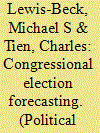

|
|
|
|
|
| Summary/Abstract |
In the United States, election forecasting has expanded from First Generation to Second Generation approaches. 1 The First Generation took hold in the early 1980s, and was dominated by a battle between structural modelers and pollsters (and to a lesser extent, the markets). The Second Generation, which had sunk deep roots by the 2012 presidential election, was dominated by Structuralists, Aggregators, Synthesizers, and Experts (as labeled by Lewis-Beck and Stegmaier 2014). The Structuralists continued in the tradition of issuing forecasts from static, single-equation explanatory models (e.g., Abramowitz 2014, Campbell 2014). The Aggregators departed from reliance on the polls of individual leading houses, instead freely combining many polls to come up with averaged, and dynamic, forecasts (e.g., Real Clear Politics). The Synthesizers joined structural models and poll aggregates to provide changing forecasts as Election Day approached (e.g., Erikson and Wlezien 2014; Linzer 2014). In contrast to this, The Experts, or Judges looked at whatever information they considered relevant, quantitative or not, arriving at forecasts shaped by current data and intuition (e.g., Cook and Wasserman 2014; Rothenberg 2014).
|
|
|
|
|
|
|
|
|
|
|
|
|
|
|
|
| 18 |
ID:
137085


|
|
|
|
|
| Summary/Abstract |
In contrasting UN with EU democracy promotion discourses, the article contributes to the debate on the substance of EU democracy promotion by approaching the question of ‘democratic substance’ from the vantage point of sovereignty. For its analytical framing, it draws on relevant aspects of Foucault's work on power. The article suggests that, due to their diverging obligations to sovereignty, the substance of democracy promotion in UN discourses revolves around an institutional-centric understanding, whereas in EU discourses we see a significant reconceptualization of democracy as a norms-based concept. The latter does not aim at the government of society but the ethical self-governance of socially embedded individuals. It is argued that, with the decreasing purchase of democracy as a universal political project and the growing concern with local contexts, the EU's norms-based conception emerges as better equipped to adapt to contemporary challenges of governing. The article concludes with raising some doubts about the democratic promise and potential of the democratic rationality underpinning EU discourses. Democracy, participation and political change are no longer conceived in terms of shaping and influencing public agenda but refer to socially shaping and influencing subjective perceptions and behaviours.
|
|
|
|
|
|
|
|
|
|
|
|
|
|
|
|
| 19 |
ID:
134524


|
|
|
|
|
| Summary/Abstract |
De facto states, functional on the ground but unrecognized by most states, have long been black boxes for systematic empirical research. This study investigates de facto states’ internal legitimacy—people's confidence in the entity itself, the regime, and institutions. While internal legitimacy is important for any state, it is particularly important for de facto states, whose lack of external legitimacy has made internal legitimacy integral to their quest for recognition. We propose that the internal legitimacy of de facto states depends on how convincing they are to their “citizens” as state-builders. Using original data from a 2010 survey in Abkhazia, we examine this argument based on respondent perceptions of security, welfare, and democracy. Our findings suggest that internal legitimacy is shaped by the key Weberian state-building function of monopoly of the legitimate use of force, as well as these entities’ ability to fulfill other aspects of the social contract.
|
|
|
|
|
|
|
|
|
|
|
|
|
|
|
|
| 20 |
ID:
137087


|
|
|
|
|
| Summary/Abstract |
This piece examines the substance of EU democracy promotion from a comparative point of view and from a perspective placing under inquiry the meaning of the idea of liberal democracy itself. Instead of assuming that the democratic ideal that the EU promotes (‘liberal democracy’) has a clear, fixed meaning, the article examines in detail what actually constitutes the ‘ideal of democracy’ at the heart of EU democracy promotion, and compares this vision to that which informs the democracy promotion of the US. It argues that interesting differences, and shifts and oscillations, in the models of liberal democracy that the EU and the US promote exist and that these are important to note in order for us to fully appreciate how the substance of EU and US democracy support can be shaped by conceptual and ideological debate on the meaning of democracy. This dynamic is particularly relevant today, in the context of the recent attempts to develop transatlantic dialogue on democracy support. This dialogue, it is suggested, plasters over some subtle but important ideological cracks over what is meant by democracy in EU and US democracy support.
|
|
|
|
|
|
|
|
|
|
|
|
|
|
|
|
|
|
|
|
|